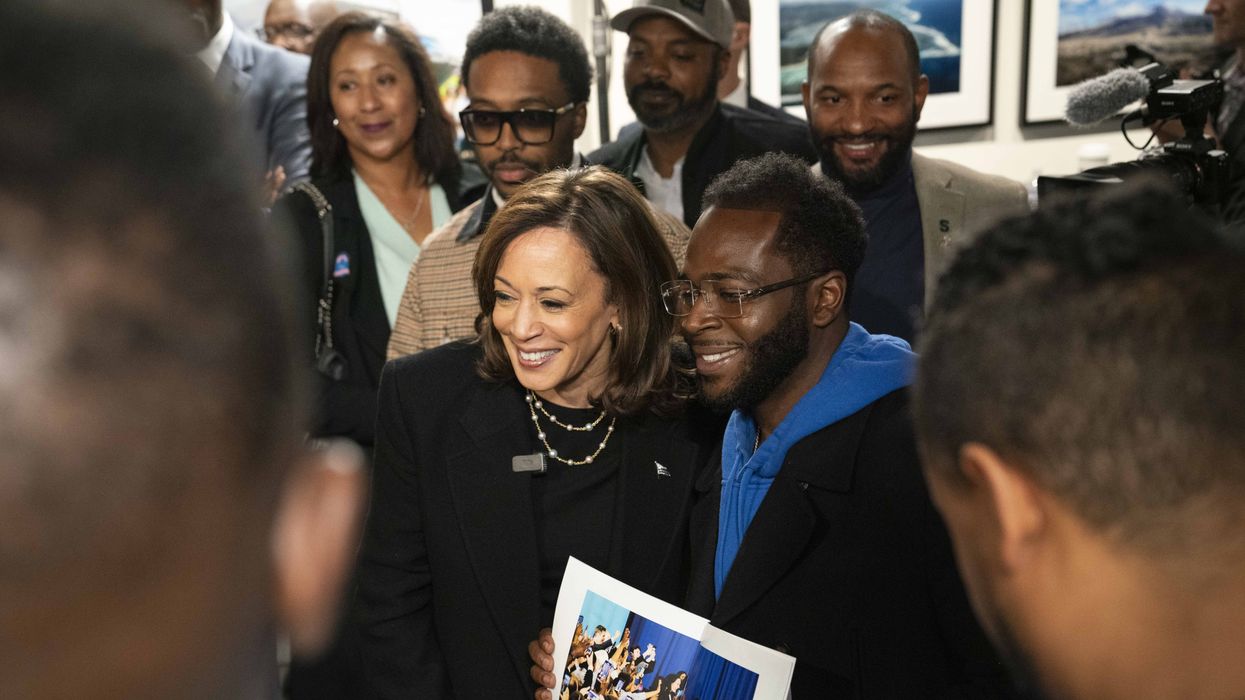Mokhtar is the co-founder and executive director of All Americans Vote.
Beginning in the 2020 election cycle, two popular narratives around Black voting patterns began gaining traction. Accurately (and at long last), Black women were being broadly recognized as “ the backbone of democracy.” Simultaneously, with much less accuracy, a narrative was created that Black men were disengaging from the franchise of voting and, more pointedly this year, abandoning a Black woman at the top of the ticket.
Headlines are meant to grab the attention of passers-by, doom scrollers and deep readers alike. But in the case of Black male voters, the headlines are wrong. The data tells the truth: Black male voters overwhelmingly support a Black woman at the top of the ticket — and the media has a responsibility to reflect that.
In my work as founder of All Americans Vote, which mobilizes Black communities to vote, I see this discrepancy every day. A recent above-the-fold, front page New York Times headline, said Black voters “drift” away from one of the two major political parties. One of the reasons often cited for this “drift” is the fact that a Black woman is the headliner. The article specifically called out Black male support dropping to “only” 70 percent. The total number of voters surveyed was fewer than 600. Politico has run similar stories. As has The Washington Post, the Los Angeles Times, etc. This narrative is not hard to find.
That same New York Times article pointed out that 75 percent of these “drifting” Black voters “said Ms. Harris would do a better job handling the issues important to them personally,” and that “Black voters are now twice as likely to say Mr. Trump’s policies had hurt them.” Any of these quotes are headline worthy — and would tell a more accurate story — but the Times chose to run with “drifting”.
Even if the Times had used more accurate language, a sample of 600 opinions can only go so far. So what does a larger data set tell us? For that, we can look at how more than 1 million Black citizens actually voted the last time a Black woman was at the top of a ticket. I present to you Georgia, 2022.
Alongside about a dozen Georgia field operators, All Americans Vote conducted a full examination of Georgia’s 2022 gubernatorial race to examine outreach to Black communities by both major party candidates. Among many other interesting findings, we learned that Black voters overwhelmingly supported the Black female candidate (Stacey Abrams). Additionally, 90 percent of the 387,000-plus Black men who cast a ballot that year voted for Abrams, a Black woman. Where were the headlines then?
Just two years prior, during the 2020 cycle, Donald Trump and Republicans were crowing about record inroads they were making with Black men. The truth is, in 2020, 87 percent of Black men chose Joe Biden over Trump. Again, if you only read the headlines, you’d never know it. Regardless of political preference, it’s important to remain grounded in facts.
All of this begs the question, if the phenomenon of disappearing support among Black men wasn’t true when it was first trumpeted in 2020, and if it was further debunked in 2022, why would it be true in 2024?
Have policies failed or shifted away from Black men in this time? The aforementioned Times article claims otherwise.
Are Black men more susceptible to latent sexism/misogyny and therefore unwilling to support a woman at the top of the ticket? The 90 percent Black male support for Abrams in 2022 indicates not.
If these negative headlines were actually true, the resulting storyline would be sad and a cause for serious concern. With overwhelming evidence to the contrary, however, this forced narrative might justifiably be reclassified as journalistic malpractice. The picture is nowhere near as bleak as it is being painted to be.
And this year, this matters more than ever. Headlines and repeat narratives can contribute to a bandwagon effect, where readers can either jump on or off based on surface level sentiments to which they are exposed over and over again. The majority of Black men men do support Black women running for high office, and to suggest otherwise — to extract choice tidbits for headlines — is misleading, at best.
Make no mistake, when it comes to Black voter engagement, we have to exhaust every resource, and never let up until every vote is counted. Honest, hard work aimed at earning every vote of every citizen is a good thing. But when it comes to mobilizing Black men, we shouldn’t have to battle headwinds that don’t actually exist.



















 From left to right: Gabriel Cardona-Fox, Bud Branch, Joe Concienne
From left to right: Gabriel Cardona-Fox, Bud Branch, Joe Concienne 